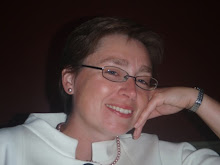Overheard in a coffee shop in downtown Palo Alto, CA, today:
Man 1: She was so professionally dressed, I thought she must be an attorney.
Man 2: No, she's a secretary.
Man 1: Really? Is she good?
Man 2: Oh yes, she's very good. In fact she's a bit too good, if you know what I mean. I try to keep her a bit flustered.
[Man 1 and Man 2 chuckle together.]
Wednesday, March 3, 2010
Friday, December 19, 2008
Do you have a 50/50 relationship?
I'm reading a preview copy of a great new book by local authors Sharon Meers and Joanna Strober: "Getting to 50/50" (to be published by Bantam Books in February 2009). The book is about how couples (typically with kids) can arrange their lives so that the woman can have a fulfilling career and the man can have a fulfilling family life with all the benefits that both of those things can bring to everyone in the family. I've just got through chapter one. I've waved it at my husband a couple of times, but he's put off by the way its obviously written for a female reader. Ah well, I'll just have to read him choice bits out loud as he sits at the computer working in the evenings.... More to come as I read!
Wednesday, November 19, 2008
New initiatives on prostitution in the UK
News from the UK of government proposals to crack down on the clients of prostitutes, with the aim of protecting trafficked women. Some controversy over whether it will actually achieve that goal. See the Associated Press story.
Tuesday, November 18, 2008
Intersex Babies
Fascinating article in The Stanford Report, November 12, on "intersex babies": i.e. babies born without a clear sex. The Stanford Report story draws on a new book, Fixing Sex: Intersex, Medical Authority and Lived Experience (Duke University Press) by Katrina Karkazis. Intersex people used to be called hermaphrodites. Sometimes they have mostly male characteristics, sometimes mostly female; the intersex characteristics may be at the genetic, gonadal, or anatomic level.
Dr Karkazis talks about changes to the way doctors view these babies. They no longer tend to treat assigning a sex as essential. Being assigned to the male or female gender is necessary, for social and legal reasons; but surgery is no longer seen as the only or best option for children with ambiguous genitalia or other anatomical intersex characteristics. Dr Karkazis advocates for a more sympathetic view of intersex people, as whole individuals with unique stories, rather than as curious biological specimens. The Stanford Report article concludes with a quote:
'We need doctors, Karkazis said, who will tell...worried parents, "I've seen this before. It's OK. There's no reason your child cannot have a marvelous life." '
Dr Karkazis talks about changes to the way doctors view these babies. They no longer tend to treat assigning a sex as essential. Being assigned to the male or female gender is necessary, for social and legal reasons; but surgery is no longer seen as the only or best option for children with ambiguous genitalia or other anatomical intersex characteristics. Dr Karkazis advocates for a more sympathetic view of intersex people, as whole individuals with unique stories, rather than as curious biological specimens. The Stanford Report article concludes with a quote:
'We need doctors, Karkazis said, who will tell...worried parents, "I've seen this before. It's OK. There's no reason your child cannot have a marvelous life." '
Leaving the Clayman Institute
I will be leaving the Clayman Institute on December 17, after more than three years as Associate Director. We are (obviously) looking for a replacement - go to the Institute's website at http://gender.stanford.edu to look for more details on the homepage. We'll also be looking for two part-time maternity cover posts for an events co-ordinator and a fellowship program manager, January to June 2009.
Monday, September 29, 2008
Silicon Valley research this week
Watch out for new research this week from the Clayman Institute at Stanford in collaboration with the Anita Borg Institute for Women in Technology. It's called Climbing the Technical Ladder: Women in Mid-Level Positions in Silicon Valley High Tech. Based on survey and interviews at six leading Silicon Valley high tech companies, it examines why women drop out of the technical ladder, and why so few women make it past the difficult mid-level tier to senior management. It reveals that women want much the same as their male colleagues - and that to improve employee loyalty and retention, companies would be advised to approach all their employees with similar initiatives. Very revealing stuff.
Labels:
bias,
clayman institute,
entrepreneurship,
innovation,
men,
research,
science,
Silicon Valley,
technology,
women
Thursday, August 21, 2008
Speak out!
I just spent the past two days in a seminar hosted by Catherine Orenstein, founder of the OpEd Project, on how to write and pitch an opinion piece. She has amazing experience of freelance writing to share, and a host of great ideas. Do you have something you want to say? Did you know that over 90% of op-ed pieces in newspapers are written by white men? Speak out! Take a look at the Op-Ed Project's website and see if they are hosting an event near you soon. You'll be surprised to learn that YOU are an expert too!
Subscribe to:
Comments (Atom)
